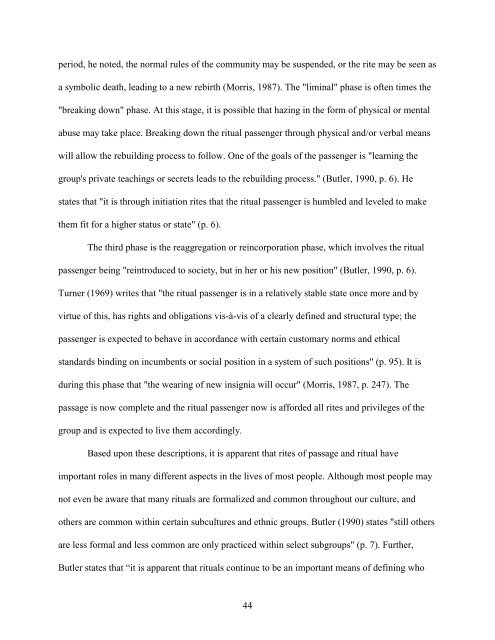Sorority Rituals - Reflections On Rites of ... - Mari Ann Callais
Sorority Rituals - Reflections On Rites of ... - Mari Ann Callais
Sorority Rituals - Reflections On Rites of ... - Mari Ann Callais
Create successful ePaper yourself
Turn your PDF publications into a flip-book with our unique Google optimized e-Paper software.
period, he noted, the normal rules <strong>of</strong> the community may be suspended, or the rite may be seen as<br />
a symbolic death, leading to a new rebirth (Morris, 1987). The "liminal" phase is <strong>of</strong>ten times the<br />
"breaking down" phase. At this stage, it is possible that hazing in the form <strong>of</strong> physical or mental<br />
abuse may take place. Breaking down the ritual passenger through physical and/or verbal means<br />
will allow the rebuilding process to follow. <strong>On</strong>e <strong>of</strong> the goals <strong>of</strong> the passenger is "learning the<br />
group's private teachings or secrets leads to the rebuilding process." (Butler, 1990, p. 6). He<br />
states that "it is through initiation rites that the ritual passenger is humbled and leveled to make<br />
them fit for a higher status or state" (p. 6).<br />
The third phase is the reaggregation or reincorporation phase, which involves the ritual<br />
passenger being "reintroduced to society, but in her or his new position" (Butler, 1990, p. 6).<br />
Turner (1969) writes that "the ritual passenger is in a relatively stable state once more and by<br />
virtue <strong>of</strong> this, has rights and obligations vis-à-vis <strong>of</strong> a clearly defined and structural type; the<br />
passenger is expected to behave in accordance with certain customary norms and ethical<br />
standards binding on incumbents or social position in a system <strong>of</strong> such positions" (p. 95). It is<br />
during this phase that "the wearing <strong>of</strong> new insignia will occur" (Morris, 1987, p. 247). The<br />
passage is now complete and the ritual passenger now is afforded all rites and privileges <strong>of</strong> the<br />
group and is expected to live them accordingly.<br />
Based upon these descriptions, it is apparent that rites <strong>of</strong> passage and ritual have<br />
important roles in many different aspects in the lives <strong>of</strong> most people. Although most people may<br />
not even be aware that many rituals are formalized and common throughout our culture, and<br />
others are common within certain subcultures and ethnic groups. Butler (1990) states "still others<br />
are less formal and less common are only practiced within select subgroups" (p. 7). Further,<br />
Butler states that “it is apparent that rituals continue to be an important means <strong>of</strong> defining who<br />
44



